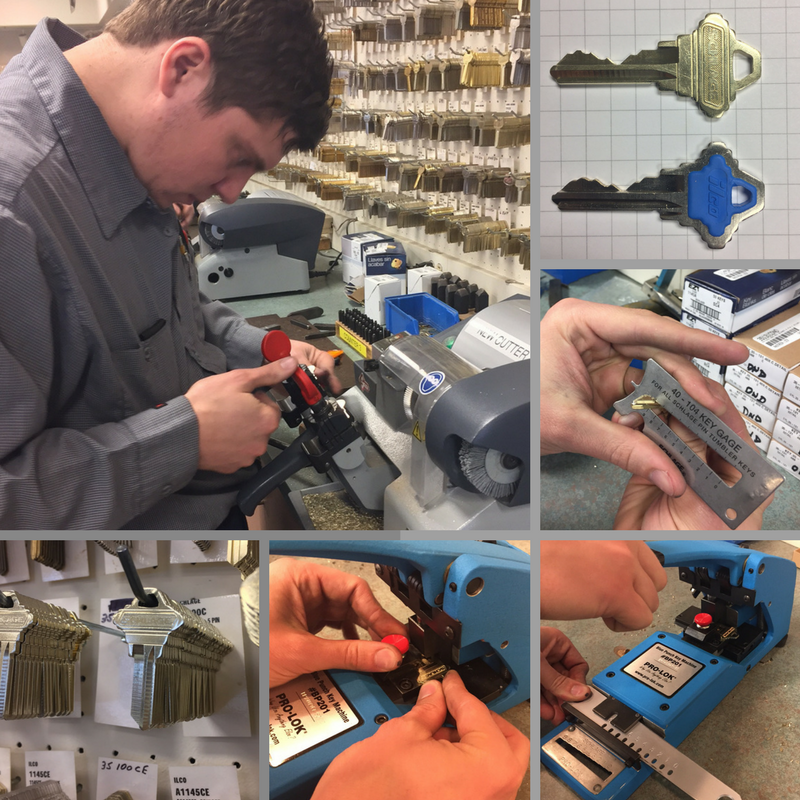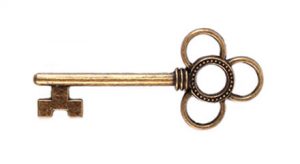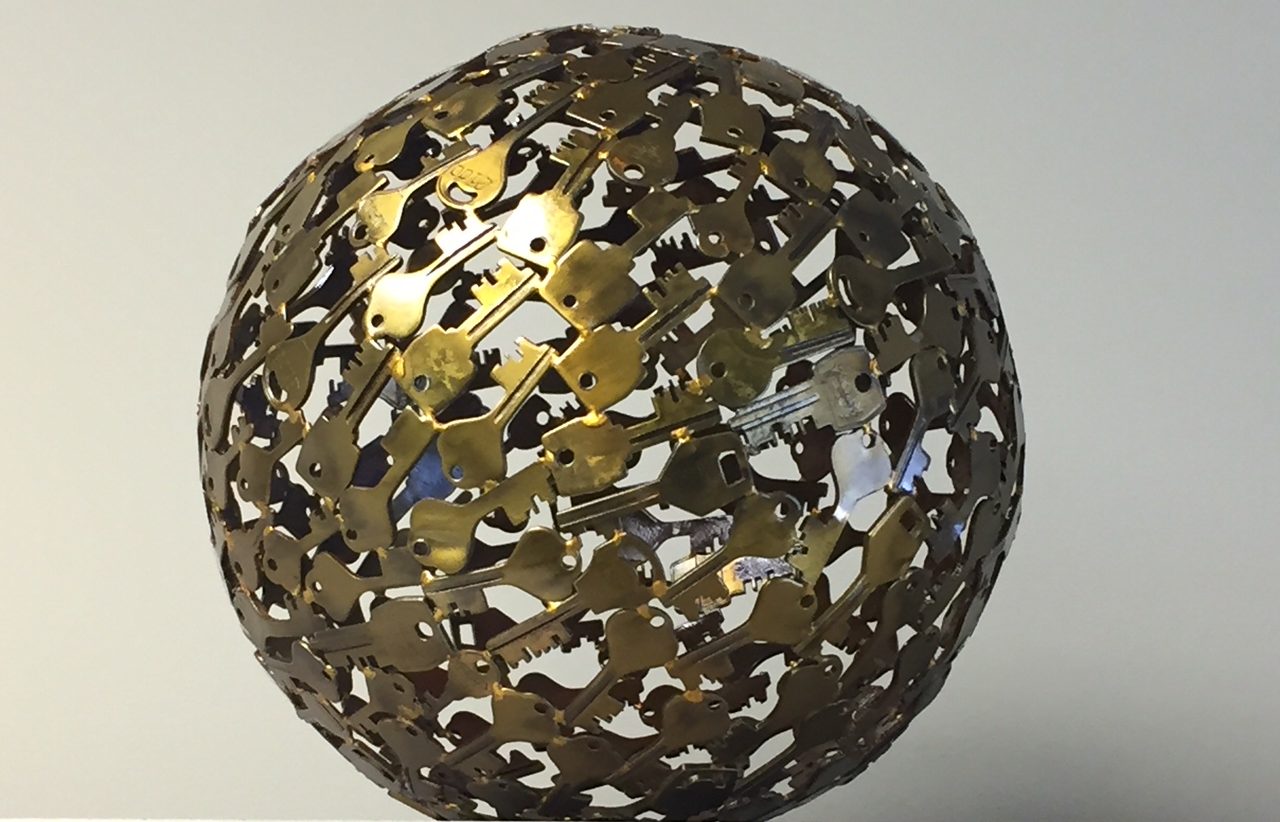
An Anderson Lock security expert uses a Pro-Lok Blue Punch Machine to duplicate a key.
Do you have to jiggle your key to get it to work?
Or pull it slightly out of the lock before it will turn? Do you have a spare key for your home in the event that you’re locked out?
It may be time to get a duplicate key made. Keys are typically made of brass or a nickel-brass mixture, and the pins in a lock are also made of brass. Over years of use, keys and pins do wear down. In addition, it’s important to have spare keys around (perhaps left with a trusted family member, friend, or neighbor) in case you’re ever locked out or need a friend or family member to get into your home for some reason.
Here’s everything you need to know about getting a new key cut as part of our Chicago locksmith services.
How are keys made?
Keys are cut with a machine called a key duplicator. Your original key is placed in a vice on one side of the key duplicator, lined up with the cutting tool (or blade), and a blank key is placed in a vice on the side of the machine that contains the alignment tool. The alignment tool is a piece of metal that is even with the blade. The key guide, or alignment bar, on your key duplicator, ensures the keys are even with one another.
The key duplicator is then turned on, and as the original and blank keys move horizontally across the machine, the blade cuts into the blank key, using the original as a sort of template. Afterward, the lock tech will sand the duplicate key for a smooth finish. The final product is a duplicate key that matches the original.
Make sure the correct key blank is used.
For residential keys, selecting the correct key blank is typically easy. At Anderson Lock, we have about a million different key blanks. We try to choose one as similar to the original as possible to ensure accuracy and quality.
In the photo at the top right of this collage, the Ilco key with the blue plastic insert shows rounded cuts and years of wear. However, the old key is still easily identifiable as a Schlage C lookalike. Tim Lankford, the lock tech shown in the top left photo, could have cut a new key on a matching “lookalike” blank, but he chose to use a Schlage original brass key blank to assure accuracy.
Don’t make a copy of a copy of a copy.
How accurate is the key that needs to be copied? When keys are worn down, they should be decoded before copies are cut. The key gauge shown in the center right-hand photo was used to determine the depths of the original cuts. In general, however, one should not make a duplicate key without the original on hand.
Take a look at the collage again. After decoding the key, Tim chose to use the “Blue Punch” key clipper, shown in the two bottom right photos. He moved the guide to choose the cut depth, then clipped the key, one cut at a time. This standard locksmith machine is easy to use, accurate, and dependable.
How long does it take to cut a key?
A professional locksmith can accurately duplicate a standard key in just a few minutes. Duplicating a more complicated key can take up to 25 minutes. How long it takes to get a key copied could depend on where you go to get your key copied.
Where to get keys copied?
While self-service key cutting kiosks are increasingly popping up in big box chains and hardware stores, these machines aren’t necessarily reliable over time. While they likely work well when new, there is no guarantee that they’re regularly recalibrated or well-maintained in the long run.
Anderson Lock keeps over a dozen key machines carefully calibrated, and if cutting wheels become dulled, they are changed to maintain flawless cuts. Many of our machines are computerized for increased elimination of human error. Our lock techs cut thousands of keys each week. We actually have a “cross reference chart” to use to identify discount store keys for all the customers who come to us saying that their “new keys don’t work.” In addition, our well-trained techs are friendly and efficient. Yes, our quality may cost more, but your time is valuable, too, and we cut keys right the first time.
Unlike the big box stores, we are not always open. That’s why we remind our customers to visit our Elk Grove or Des Plaines location to “Get an extra key before it is needed!”
Can I make a duplicate key without the original?
It’s possible to have a duplicate key made without the original. If you don’t have the original key or it has been too worn down over time, you’ll need to see a professional locksmith who can use a code cutter to identify the groove depths of your lock’s key code. This will inform the locksmith how your key needs to be cut to create the right match.
However, as mentioned, we do not recommend making a copy of a copy. In other words, we do not recommend making a duplicate key without the original.
Can I duplicate skeleton keys?

Perhaps you collect antique skeleton keys, or you live in an old home with interior locks that still use skeleton keys. If so, a professional locksmith can create duplicates of your skeleton keys.
We still cut and sell skeleton keys at Anderson Lock in Des Plaines for use in old residential locks, as well as for fine cabinetry. If you need a skeleton key, we can help.
What are jiggle keys?
Jiggle keys are keys that come in a range of groove patterns and are used to attempt to open a lock in absence of the correct key for that lock. Termed “jiggle keys” because they typically require some jiggling around to successfully open the lock, these tricky keys are often used to pick locks. Also called “bump keys,” jiggle keys should not be used by the average person as an alternative to having a spare. It’s best to visit a professional and have duplicates made of all your important keys.
Rely on Anderson Lock for your “key” questions!
At Anderson Lock, we look forward to answering Chicagoland customers’ questions about all things keys. Whether you’re wanting to know what keys are made of, or you’re just wondering where you can get your key cut, you can rely on our experts to answer your questions. Feel free to contact us online or call us at 847-824-2800 with your key-related questions! Or visit us at our Elk Grove or Des Plaines locations. We look forward to hearing from you.



